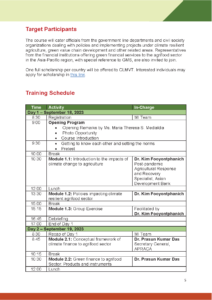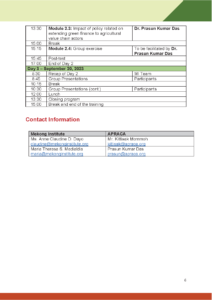
Addressing climate change and transforming agri-food systems are key to meeting the Sustainable Development Goals (SDGs). The agricultural sectors, including crops, livestock, forestry, fisheries, and aquaculture are greatly dependent on climate stability. It is estimated that in the medium to long term climate-related changes will lead to negative effects on yields of agricultural and allied commodities and potentially impact the economic returns in the less developed countries. Conventional approaches to understanding climate change to agriculture are limited to identifying and quantifying the potential long-term climate impacts on different ecosystems and economic sectors. The Asian economies with special reference to the Greater Mekong Sub-region (GMS) are facing the climate variations which resulted in unsustainable agricultural practices and worsen the water related issues (drought and flood), limit productivity, increased income inequality and sub-regional income disparity.
Green finance emerged as one of the critical elements for the transformation of agrifood systems to be sustainable and climate resilient. However, the flow of green investment funds to the value chain actors in the downstream is reported to be extremely low in the Asian region with special reference to some of the countries in the Mekong region. Investment in AgriTech startups is much lower than for other technology startups. National governments already initiated some efforts to mainstream finance to greening agriculture by the commercial banking entities, who need support to build their capacity. The private sector investments into downstream agrifood value chains have also been limited partly due to lack of enabling policies and well-crafted incentives.
The studies conducted by the global and regional agencies confirmed that the agrifood ecosystem in the Asian region under the current threat of climate changes are facing four (4) major challenges: (a) disconnect between climate resilient agrifood and investments in developing green infrastructure; (b) underdeveloped green supply/value chains as all the actors are do not have the access to finance from public and private sectors; (c) capacity of both the supply and demand side actors to estimate the magnitude of loss due to climate change and other related factors; and (d) non-availability of sustainable business models, low-carbon investment instruments, low carbon technologies, trade practices, and policies that encourage environmentally sustainable development to agrifood sector. A paradigm shift is required both in food and agriculture and in finance to develop efficient markets around sustainable financial flows for the sector, including true cost valuations of environmental services.
In recent years, collaboration among technical institutions and supply chain actors has been growing, new solutions have emerged, and interest in the agenda to support greening the agricultural sector has gained momentum among both private investors and governments. However, a large gap remains between needs and action. Both the Mekong Institute (MI) and the Asia-Pacific Rural and Agricultural Credit Association (APRACA) joined hand to build the capacity of the supply and demand side support system for integrating green elements in to the local and sub-regional agrifood system.
The overarching objective of this three-day training program is to strengthen the capacity of the support system (government line departments, civil society organizations and financial institutions) on understanding the current state of climate resilient agriculture and green and climate finance for the agrifood sector. The specific objectives are to:
- Deepen understanding on impacts and pathways to mitigate the risk of climate change in the agrifood sector;
- Present pathways to capture the ‘triple dividend’ by supporting investments that contribute to improve the cross-border trade in the agrifood sector; and
- Align finance with sustainability and integrate environmental risks and opportunities into decisions that drive lending, investment, and insurance.
Module 1: Overview of Climate Change and its Associated Risks in the Agrifood Sector
This module leverages scientific findings along with practical examples to elucidate the multifaceted repercussions associated with changing climatic conditions. The first topic, “Introduction to the Impacts of Climate Change to Agriculture,” addresses both direct and indirect consequences of climate changes on agricultural activities—ranging from altered crop yields and livestock health to shifts in pollination and pest dynamics. The discussion flows logically to yield a comprehensive understanding of how normal weather pattern shifts can trickle down to influence food production, leading to possible imbalances in food accessibility, affordability, and nutritional quality.
The second topic, “Policies Impacting Climate Resilient Agrifood Sector,” delves into the world of agriculture and environmental policy, illuminating how they intersect and shape the trajectory of agrifood systems in the face of climatic threats. This includes presentations of various policy strategies geared towards encouraging resilience, such as subsidies for climate-smart technologies, insurance schemes for farmers, and regulations guiding sustainable agricultural practices.
By the end of the module, the learners should have a deeper understanding of the complexities surrounding climate change impacts on agriculture and the legal frameworks aiding the sector’s resilience.
Topics:
- Introduction to the impacts of climate change to agriculture
- Policies impacting climate resilient agrifood sector
Module 2: Green Financing in the Agrifood Sector
The module is aimed at understanding climate-conscious financing in the context of agricultural and food industries. It presents a synthesis of theoretical frameworks, practical applications, and policy impacts of green finance within this sector. The first topic, “Conceptual Framework of Climate Finance to Agrifood Sector,” explicates the basic principles and theories behind climate finance, its significance, and its potential role in the agrifood sector. The emphasis is on how it could incentivize environmentally friendly practices, promote sustainability, and mitigate climate change impacts within this sector.
The second topic, “Green Finance to Agrifood Sector: Products and Instruments,” transitions from theoretical foundations to an in-depth exploration of various green financial products and tools available for agrifood business entities. The discussion covers instruments like green bonds, loans, grants, green equity investment, and risk guarantees, illuminating their structure, function, benefits, and real-world applications in the agrifood sector.
The third topic, “Impact of Policy Related on Extending Green Finance to Agricultural Value Chain Actors,” examines the intersection of policy and green finance. It delves into the myriad ways in which policy decisions shape the availability and accessibility of green finance for stakeholders in the agricultural value chain, from farmers to distributors. This topic also highlights successful policy strategies that have managed to instigate an impetus for green finance within the agrifood sector.
By the end of the module, participants should gain a robust understanding of green finance’s vital role in the agrifood sector and how it can drive industries closer to sustainable development.
Topics:
- Conceptual framework of climate finance to agrifood sector
- Green finance to agrifood Sector: Products and instruments
- Impact of policy related on extending green finance to agricultural value chain actors
The training program will employ training approaches that consider the goals and objectives of the training program and the profile of the participants. The course content will be delivered through short lectures, group discussions, group presentations, and case studies.
The course will cater officials from the government line departments and civil society organizations dealing with policies and implementing projects under climate resilient agriculture, green value chain development and other related areas. Representatives from the financial institutions offering green financial services to the agrifood sector in the Asia-Pacific region, with special reference to GMS, are also invited to join.
Mekong Institute
Ms. Anne Claudine D. Dayo [email protected]
Maria Theresa S. Medialdia [email protected]
APRACA
Mr. Kittisak Mommoh [email protected]
Prasun Kumar Dash [email protected]




